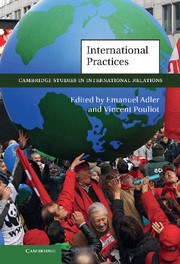Book contents
- Frontmatter
- Contents
- Figure
- Note on the contributors
- Acronyms and abbreviations
- Part I Practices in International Relations and social theory
- Part II Practices and their background
- 3 A practice theory of emotion for International Relations
- 4 Background knowledge in the foreground
- 5 Interactional international law and the practice of legality
- Part III The evolution of practices
- Part IV Practices in practice
- Part V Conclusion
- Index
- References
3 - A practice theory of emotion for International Relations
from Part II - Practices and their background
Published online by Cambridge University Press: 05 June 2012
- Frontmatter
- Contents
- Figure
- Note on the contributors
- Acronyms and abbreviations
- Part I Practices in International Relations and social theory
- Part II Practices and their background
- 3 A practice theory of emotion for International Relations
- 4 Background knowledge in the foreground
- 5 Interactional international law and the practice of legality
- Part III The evolution of practices
- Part IV Practices in practice
- Part V Conclusion
- Index
- References
Summary
There is growing appreciation among International Relations (IR) scholars that emotion matters fundamentally to the dynamics of world politics. But discerning and establishing just how has proven rather difficult. At the heart of the problem is that the phenomenon of emotion does not “fit” conveniently into any of the usual orienting categories used in IR. Emotions are the embodied experiences of concrete persons but they are not actually the “properties” of those persons. Rather than things people have, emotions are contingent ways-of-being human – that is, experiences of human being – that emerge from interactions between agencies and structures of both material and social sorts. They are neither substance nor process, neither natural nor cultural, neither cognitive nor physiological. In the context of IR, this means that it makes little sense to try to apprehend emotions through the levels-of-analysis framework that organizes the field. For those interested in understanding the role of emotion in world politics, the daunting questions begin with how one begins.
I found myself facing these questions during the course of an ongoing research project when I came to suspect that emotion was a key force in producing the outcome that interested me. Since this was not what I had expected, pursuing my suspicion meant taking a considerable detour to figure out how other scholars had managed to study emotion. What I found, both in and outside of IR, is that most scholars have met the challenge by dodging it. In IR, in particular, the existing literature on emotion succeeds in examining its role in world politics only to the extent that it wittingly or unwittingly assumes away the ontological complexity of emotion. It was in this context – that is, in search of a way to conceptualize, theorize, and perform empirical research on emotion in world politics – that I stumbled into practice theory.
- Type
- Chapter
- Information
- International Practices , pp. 63 - 86Publisher: Cambridge University PressPrint publication year: 2011
References
- 72
- Cited by



